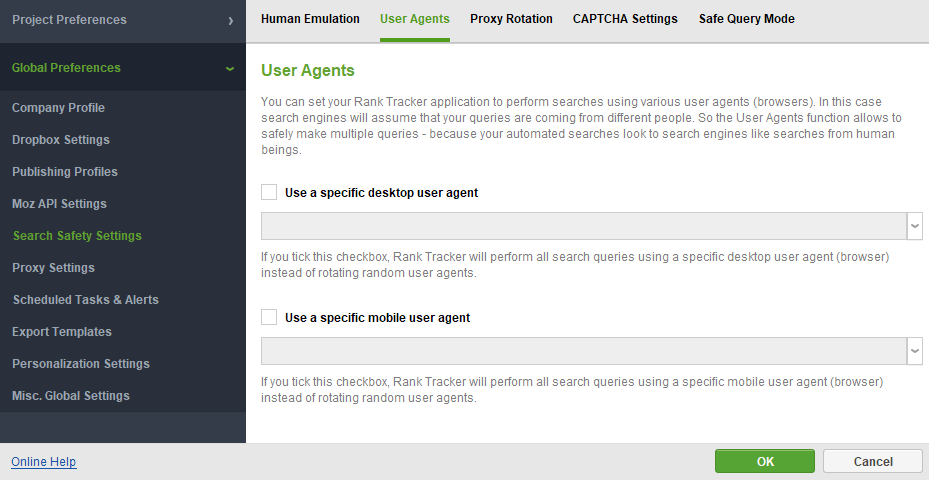
Decoding User Agents: The Essential List of Popular Browsers for Enhanced SEO Strategies

Decoding User Agents: The Essential List of Popular Browsers for Enhanced SEO Strategies
Disclaimer: This post includes affiliate links
If you click on a link and make a purchase, I may receive a commission at no extra cost to you.
User agent
Contents
- “User Agent” Definition
- What is User Agent used for?
- Types of User Agents
- How to find my user agent in a browser?
- How to switch my user agent in a browser?
- Examples of User Agents
- Importance
- Related links
- References
“User Agent” Definition
A user agent is a string of text that is sent by a web browser to a web server to identify itself and provide information about the browser’s capabilities. The User Agent string can include information such as the browser type and version, the operating system, and the device type.[1]
What is User Agent used for?
Web servers use the User Agent string to determine how to serve content to the browser. For example, a web server may use the information provided in the user agent string to serve a different version of a website to a mobile device than it would to a desktop computer.
The user agent is transmitted to a web server through the HTTP header of a request made by a web browser.
Build high-quality backlinks
with the free LinkAssistant tool



When a web browser makes a request to a web server (for example, to load a web page), it sends an HTTP request message to the server. This message includes an HTTP header, which contains a variety of information about the request. One of the pieces of information in the HTTP header is the user agent string.
Here is an example of an HTTP request message with the user agent string in the HTTP header:
GET /index.html HTTP/1.1 Host: www.example.com User-Agent: Mozilla/5.0 (Windows NT 10.0; Win64; x64) AppleWebKit/537.36 (KHTML, like Gecko) Chrome/79.0.3945.79 Safari/537.36
In this example, the user agent string is Mozilla/5.0 (Windows NT 10.0; Win64; x64) AppleWebKit/537.36 (KHTML, like Gecko) Chrome/79.0.3945.79 Safari/537.36.
The web server receives the HTTP request message and reads the HTTP header, including the user agent string. It can then use this information to determine how to serve content to the browser.
Types of User Agents
There are many different types of User Agents, including:
- Web browsers: These are the most common type of user agents. Examples include Google Chrome, Mozilla Firefox, and Microsoft Edge.
- Mobile apps: Many mobile apps act as user agents, making requests to servers and displaying the responses to the user.
- Desktop applications: Some desktop applications, such as email clients and chat clients, act as user agents when they communicate with servers.
- Bots and crawlers: These are automated user agents that are often used for tasks such as web indexing[2] , site monitoring, and data mining.
- Internet of Things (IoT) devices: These are user agents that represent devices connected to the Internet, such as smart thermostats, security cameras, and home appliances.
- Custom user agents: Some user agents are designed specifically for a particular purpose and are not generally available to the public. For example, a company might develop a user agent to perform automated testing of its website.
The image above shows how you can set up custom user agents to control rank tracking in the Rank Tracker tool[3] .
Set up custom user agents for rank tracking
with the free Rank Tracker tool



How to find my User Agent in any browser: Chrome, Firefox, Edge?
Here’s how you can check and get the user agent using your browser’s console:
- Open the developer tools in Google Chrome, Microsoft Edge, Mozilla Firefox, Safari or any other browser. You can use F12 or Ctrl+Shift+I on Windows/Linux, or Cmd+Option(⌘)+I on macOS.
- Switch to the Console tab.
- Type navigator.userAgent in the console and press Enter (or Ctrl+Enter). The console will return a string which is your browser’s user agent.
Remember, it’s generally not recommended to use user agent to detect the browser for serving different web pages or services. Instead, consider using feature detection, which checks if the specific feature you need is available. This approach is more robust and future-proof.
Please note that it’s possible to change or “fake” what your web browser sends as its User Agent. Some browsers let you change this setting, affecting what’s known as “Mobile Mode” or “Desktop Mode”. However, changing your user agent should be done with caution as it can affect how websites are displayed and function.
How to switch my User Agent in any browser: Chrome, Firefox, Edge, Safari?
You can easily change and fake your browser’s user agent in a few steps. Here’s how you can do it for different browsers:
How to change user agent in Google Chrome & Microsoft Edge
- User agent switcher is part of its Developer Tools. Open them by clicking the menu button and selecting More Tools > Developer Tools. You can also right-click anywhere on a webpage and select Inspect, or use F12 or Ctrl+Shift+I on Windows, or Cmd+Option(⌘)+I on Mac.
- Choose More Tools > Network Conditions by clicking on the three vertical dots on the upper right corner.
- Uncheck the Select Automatically checkbox.
- Choose one from the built-in User-Agents list or enter any string you want in the field below the list.
How to switch user agent in Mozilla Firefox
- Type about:config into Firefox’s address bar and press Enter.
- Right-click on the about:config page, point to New, and select String.
- Name the preference general.useragent.override.
- Enter your desired user agent as the value of the preference.
How to change user agent in Safari
- Go to Preferences.
- Enable Develop Menu Bar by going to Advanced and checking Show Develop menu in menu bar.
- Navigate to Develop > User-Agent. You can select from a predefined list or enter a custom user-agent string by choosing _Other…_
Please note that changing your user agent should be done with caution as it can affect how websites are displayed and function. Also, these settings are temporary and only apply while you have the Developer Tools pane open, and it only applies to the current tab.
List of User Agents for desktop browsers (Chrome, Mozilla Firefox, Edge, Safari) and mobile devices (Apple, Android)
Here are some examples of user agents for different devices and browsers:
Desktop Browsers
Microsoft Edge on Windows
Mozilla/5.0 (Windows NT 10.0; Win64; x64) AppleWebKit/537.36 (KHTML, like Gecko) Chrome/119.0.0.0 Safari/537.36 Edg/119.0.0.0
Google Chrome on Mac OS X
Mozilla/5.0 (Macintosh; Intel Mac OS X 10_15_7) AppleWebKit/537.36 (KHTML, like Gecko) Chrome/119.0.0.0 Safari/537.36
Google Chrome on Windows
Mozilla/5.0 (Windows NT 10.0; Win64; x64) AppleWebKit/537.36 (KHTML, like Gecko) Chrome/119.0.0.0 Safari/537.36
Mozilla Firefox on Windows
Mozilla/5.0 (Windows NT 10.0; Win64; x64; rv:109.0) Gecko/20100101 Firefox/119.0
Mobile Apple Devices
Safari on iPhone (iOS) and iPad (iPadOS)
Mozilla/5.0 (iPhone; CPU iPhone OS 16_5 like Mac OS X) AppleWebKit/605.1.15 (KHTML, like Gecko) Version/16.5 Mobile/15E148 Safari/604.1 Mozilla/5.0 (iPad; CPU OS 16_5 like Mac OS X) AppleWebKit/605.1.15 (KHTML, like Gecko) Version/16.5 Mobile/15E148 Safari/604.1
Mobile Android Devices
Chrome on Android
Mozilla/5.0 (Linux; Android 10; K) AppleWebKit/537.36 (KHTML, like Gecko) Chrome/114.0.0.0 Mobile Safari/537.36
Samsung Galaxy S22 5G:
Mozilla/5.0 (Linux; Android 13; SM-S901B) AppleWebKit/537.36 (KHTML, like Gecko) Chrome/112.0.0.0 Mobile Safari/537.36
Please note that these are just examples and the actual User Agent string can vary based on the specific version of the browser and the operating system.
You can find more information on how different browsers deal with user agents on their official websites:
- User-Agent reduction in Google Chrome for desktop . List of user agent strings for iOS or Android
- List of Mozilla Firefox user agent strings
- List of Microsoft Edge user agent strings
Importance
User agents play a crucial role in the way the World Wide Web functions, as they enable users to access and interact with online content and services. Some of the key benefits and importance of user agents include:
- Interoperability: User agents enable different devices, platforms, and software to communicate with each other and access the same online content and services.
- Accessibility: User agents enable users with disabilities to access the web by providing features such as text-to-speech, screen magnification, and keyboard navigation.
- Personalization: User agents can store user preferences and settings, such as language and display options, which allow for a more personalized web experience.
- Security: User agents can implement security measures, such as SSL/TLS encryption and certificate verification, to protect user data and prevent malicious attacks.
- Innovation: User agents enable the development of new and innovative technologies, such as virtual and augmented reality, which can enhance the user experience.
Overall, user agents are an essential component of the web ecosystem, enabling users to access and interact with online content and services in a convenient and secure manner.
Related links about User Agent
How Google Crawler Works: SEO Starter-Pack Guide
References
1. https://en.wikipedia.org/wiki/User_agent 2. https://developers.google.com/search/docs/crawling-indexing/overview-google-crawlers 3. https://www.link-assistant.com/help/rank-tracker/search-safety-settings.html#useragentnew
Also read:
- [Updated] Navigating YouTube's Featured Slot A Detailed Explanimation
- Automate Le Sync Des Fichiers Dans Windows 11, 10, 8 & 7: Deux Méthodes Faciles À Suivre
- Clone Windowss 11'S HDD Dynamisch: Lerne Die Besten Zwei Ansätze Kennen
- Cloud Data Management Made Simple and Fast - De Voornaamskeurste Wegwijzer
- Guide Complet : Comment Réaliser Une Restauration Informatique Avec Google Drive
- Guide Étape Par Étape Pour Redécouvrir L'option 'Réinitialiser Ce PC' Sur Votre Système Windows.
- How to Budget for Video Popularity on YouTube
- How To Fake GPS On Honor V Purse For Mobile Legends? | Dr.fone
- In 2024, How to Change/Add Location Filters on Snapchat For your Realme 11X 5G | Dr.fone
- In 2024, Three Ways to Sim Unlock Honor X50
- Installing and Updating Toshiba Satellite Dynabox Drivers for Windows Computers
- Installing Your Best Photo Companion on Windows OS Versions
- Master the Art of Striking GoPro Time-Lapse Videos for 2024
- Step-by-Step Fixes for Common iCloud Email Problems: Overcoming 'iCloud Mail Not Working' Challenges
- Tom's Tech Hub: Leading the Way in Computer Components
- Wiederherstellung Verlorener Videoinhalte Von USB-Sticks Mit MyRecover
- クローンソフトの利用価値に関する洞察
- Title: Decoding User Agents: The Essential List of Popular Browsers for Enhanced SEO Strategies
- Author: John
- Created at : 2025-02-25 22:25:41
- Updated at : 2025-03-04 00:00:26
- Link: https://win-docs.techidaily.com/decoding-user-agents-the-essential-list-of-popular-browsers-for-enhanced-seo-strategies/
- License: This work is licensed under CC BY-NC-SA 4.0.
